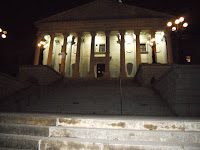 In one direction: The interstate, the city of Columbia, the new offices of South Carolina Primary Health Care, where I volunteered for the Migrant Health Project. People sat at their desks there in suits, dresses, and ties. Bars, fitness clubs, restaurants, and music clubs were all in that direction.
In one direction: The interstate, the city of Columbia, the new offices of South Carolina Primary Health Care, where I volunteered for the Migrant Health Project. People sat at their desks there in suits, dresses, and ties. Bars, fitness clubs, restaurants, and music clubs were all in that direction. 

Along its sides stood monuments which told an official version of state history. There were monuments to the confederate dead, and to Strom Thurmond. Other monuments in bronze honored the state's African Americans, and their long history: from slaves in the fields of indigo, to achievements in the present day.  Our landlady, Jennet, told us that in the other direction was "nothing." For her, as for most people in Columbia it was nothing. It was more suburbs.Then it was sprawling fields of peaches, corn, cucumbers, tomatoes, and plants city people couldn't tell apart from each other.
Our landlady, Jennet, told us that in the other direction was "nothing." For her, as for most people in Columbia it was nothing. It was more suburbs.Then it was sprawling fields of peaches, corn, cucumbers, tomatoes, and plants city people couldn't tell apart from each other.
The change was nowhere near as sudden as it sounds. The countryside was not a wasteland. Big farms had offices and receptionists. Farmers and ran their fields like factories, only with hotter and tougher work.
The country was in many ways more random than the city. Downtown for one town was an old-fashioned-looking block of brick buildings that happened to include a Mexican popsicle store. In another town, the "center" of town seemed to be a white Victorian-style house serving as the office for an IGA store.
It
People who had come from far away to work the land often had no way to drive anywhere else, and no reason to do so. To them, the lights of Columbia and the steps of the capital were a faint rumor, if they were anything.
No comments:
Post a Comment